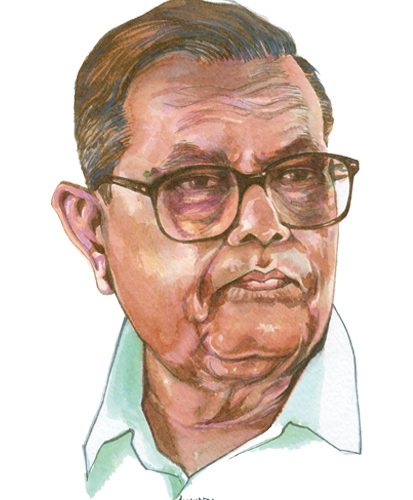Telugu: Kalipatnam Rama Rao
“I am fed up. I can’t settle these silly quarrels,” said Sundara Ramayya’s wife tossing an object that almost weighed a kg in front of her husband. It landed in Sundara Ramayya’s lap after bouncing off the floor.
Sundara Ramayya got curious about the weight that landed in his lap. When he checked it, he found a pack of five brand new writing pads.
They were the writing pads that children use at examinations. Four of them were similar… like the offspring of the same parentage. The fifth one was different. It was a bit larger in size, and the paper used for it looked both expensive and exquisite. Besides, it had four attractive corner pockets made of calico.
Sundara Ramayya’s first four issues were sons and the fifth was a daughter. The first three were attending high school.
When Sundara Ramayya looked up, he saw the last two children standing near the threshold of his room. Noticing their father was cool, the children ventured to step in. When their father enquired coolly about the dispute, the son completed what the daughter had begun:
“The second brother was trained how to prepare writing pads at school. They actually made the writing pads at school and sold them at school at 30 paise apiece. The elder brother worked out that they could make six pads with an investment of half a rupee. When they informed their mother that while the same pads were being sold at six annas a pad and all of them could get pads for half a rupee, she gave them the half-rupee they asked for. As they were only five people, they initially planned to make only five pads. When they invested the remaining sum on one pad, that turned out to be the fifth pad with attractive calico corner pockets.
“The eldest one laid claim for the calico pad because he was the eldest of the lot and also studying the highest class. But the second brother disagreed and laid his claim as it was he who made it. Mother recommended the eldest one to take it initially, but when the second one presented his argument, she consented for the second one to take it. As there was no agreement between the two brothers, the dispute came to their father’s attention for the redressal.”
It was not such a challenging issue that Sundara Ramayya cannot resolve. But he hesitated.
He named his eldest son after his father. So, rest of the children had a feeling that their father was prejudiced in his favor.
The second son was named after his mother’s father. That ‘she was prejudiced in his favor for that reason,’ was the settled opinion of the childless, widowed elder sister of Sundara Ramayya who lived with him.
Sundara Ramayya did not like such taking sides by his children or the elders. He wanted his children should stand united and live in harmony like the epical characters, Lord Rama and his siblings.
So, he thought that he should not hurry to take a decision.
“Go! Ask all your brothers to come here,” he said to his youngest son.
After he had left, “Go, call your mother here,” he said to his daughter.
The eldest son one was fair, slim, and stylish-looking. He had bright intelligent eyes. He looked more like a well-tended and carefully groomed mango plant.
The second one was of a heftier-built and of rude mien that made him look older of the two. But the grit behind his closed lips and the abounding confidence reflecting in his eyes would never escape onlookers’ attention; they also conveyed that one should be on guard while dealing with him.
Sundara Ramayya could sense wounded pride in his eldest child and his desperate effort to cover it up. His legs were unsteady, and his smile was hollow. Yet, there lingered a trace confidence still left in him.
His second soon looked firm like a stone statue resting on its back that one finds on any old temple pillar. He was standing erect on his legs, locked hands behind his back, and his teeth, eyes and jaw were rigid suggestive of strong uncompromising attitude behind them. One would normally find some overbearing load on the back of leaning statues on the temple pillars. This boy was not burdened that way, but his face was yam-red- perhaps unable to reconcile to the fact that the dispute had escalated to his father’s decision.
Sundara Ramayya was of the opinion that his second son was of haughty temperament and would get serious in no time for everything. Rest of the children gathered around to dispassionately watch the proceedings out of curiosity for the outcome. Sundara Ramayya’s wife was standing near the door. She was tight-lipped and looking seriously absorbed.
Sundara Ramayya deliberately avoided looking at his elder sister. But she was looking at her younger brother with the same reassurance of a witness finding the sitting Judge was none other than the boy who took meals in their house, once every week, as a student.[1]
Surveying all their faces keenly, excepting his second son on whom he threw a cursory glance, Sundara Ramayya said with a gentle smile,
“Let me hear your individual opinions first, before I announce mine.”
There was no response.
He wanted to ask his eldest son to give his opinion first. But he changed his mind and asked his youngest to start.
After this announcement, he felt he was conducting a fair trial.
The youngest dithered for a while first, then she smiled, then she blushed and finally ran away from the scene.
The youngest son did not mince words. Because he was the youngest, he claimed, that he should get the first preference.
“How come you are the youngest? Your sister is the youngest. In that case, the pad should go to your sister.”
“After all, she is studying only class one. Of what use is the pad to her?”
“You are only in class three? Of what use is to you?”
“I can use it from next year onwards.”
Sundara Ramayya felt happy that his last child showed some spark of intelligence in his argument.
The third one put forward his case even more logically:
“The two elder brothers are big enough to make better pads than this on their own if they so choose. The two little ones cannot make much use of it. So it is fair that I should get it. But, if one were to choose between the two elder brothers, it is fair that the second one should get it. He would be happy with any pad because he did not make any of them. He only applied paste and that did not merit laying claim.”
The second one was too brief in presenting his case:
“The idea was given by the elder brother. Mother provided the money. But it was me who made all of them. There is nothing more for me to say.”
“I don’t have any fancy for that pad. But I was irritated when the second one laid claim as a matter of right for making it. That is why I pressed my claim for it. For that matter, it was me who had given the idea how it could be made and convinced mother to get the money,” concluded the eldest.
“Mother shall provide money to whosoever asks for it. It was the second brother who went to market, purchased all the things and prepared those pads. So, the disputed pad should rightfully go to him,” reasserted the third one.
“If the eldest one has not given the idea, these pads will never have been made,” someone said.
“Pads cannot be made just out of ideas,” countered another.
Like the judge in a court, Sundara Ramayya called out, “Order! Order!”
When all of them fell silent, looking at the pads he went into a kind of mental review of the arguments presented, with a pleasant smile dancing over his lips.
For some strange reason, he refrained from collecting the opinion of his wife and his elder sister.
His wife never expressed her opinion unless asked for; his sister never refrained from giving her opinion unasked for.
Yet, his sister patiently waited for Sundara Ramayya to seek her opinion. When she had sensed that Sundara Ramayya was about to say something, she could not restrain herself anymore and she opened up. Surveying around before speaking and thrusting her head forward while speaking were her mannerisms.
“Listen! If you ask me it is fair to give it…”
“To the eldest nephew,” the second nephew intervened and completed her sentence, imitating her.
His train of thoughts was snapped when Sundara Ramayya heard the strange voice of his second son. Looking into his eyes keenly, he asked, “Why do you think so?”
“He is, after all, the eldest of the family. And ultimately… someday… after you…” the intonation and the jibe in his reply did not escape the attention of his aunt.
Nobody was looking at Sundara Ramayya.
“Yes! The eldest is always the eldest! And all of you come only next to him. It is fair that the eldest gets the first preference to choose.” She only reiterated what her nephew had subtly made out her intentions clear already.
The man within the second child was really a funny and teasing fellow. As he looked into the face of his aunt, one could see a restrained, ferocious hound howling at his game and ready to pounce upon it.
Sundara Ramayya’s wife could no longer keep mum when she saw her sister-in-law bullying her son.
“If you speak of customs and fair practices, the eldest is supposed to make only equal divisions. It is for the youngest to choose first,” she declared.
Oblivious to what his aunt was saying in reply, the fourth son picked up from where his mother had left off,
“In that case, I must choose first.”
“No, in that case, it is our sister’s turn first,” objected the third one.
Sundara Ramayya seemed upset with the kind of worldly wisdom passing on to his children.
“Will you please keep quiet!” he said addressing the children but intending the elders.
All of them kept quiet.
Sundara Ramayya thought that his wife’s suggestion seemed reasonable.
So he announced: “That idea seems good. Let the last boy choose first.”
“He has already made his choice earlier. He took one of the other already,” announced the second son.
The kind of glow seen in his eyes was of the chess player who checkmates his opponent with his last move.
“That choice was annulled. Let me make a fresh choice. I was ignorant then. Give me the calico pad now,” stepped forward the youngest looking at his elder brother like the victorious general at the vanquished king.
“Wait!” ordered the second son. “If your earlier choice was annulled, the entire process should be treated as annulled to the last.”
The youngest son stopped in his tracks.
“What do you mean? Do you think that everything should go according to your dictates?” the aunt confronted her second nephew.
Without answering her question, he looked into his father’s face.
Sundara Ramayya could not avoid his looks.
“You can go!” Sundara Ramayya said to his youngest son.
“Pch! What can we do?” he said laconically and left the place with a smiling face. It’s a pity that nobody seemed to notice his conduct of saintly indifference.
The third one looked into the face of the eldest teasingly. Of course, he was well aware that, had it not been for the presence of their father there, he might have taken a good beating.
Sundara Ramayya grew restless. He was not able to decide. His mind was wavering.
For once he entertained the idea of drawing out lots; ‘how about hiding them all declaring that they belong to nobody,’ he debated on the next; ‘tear them to pieces and put them in a dustbin to avoid this nuisance,’ he thought his wife might say on the third; and alternatively, ‘couldn’t I make a better-looking pad and present it to the eldest son?’ he reasoned within. But it looked unmanly to present something to someone just out of some lame excuse.
“Why did you make this one different from the rest?” he asked impatiently at last.
“That was also the idea of the eldest brother.”
“The second brother proposed to make all pads alike.”
“‘Then everyone can take any pad whenever a need arose,’ he also suggested.”
Sundara Ramayya was getting fidgety as no choice seemed fair and undisputable. His failure to find proper solution was fueling his impatience. He was deeply lost in thought. That no problem was unsolvable when enough time was spared in resolving it – was his studied opinion.
In the meantime children started teasing one another.
“If only we thought of it, we could make ten pads like that,” boasted the fourth one.
“Who prevented you from doing that? Why don’t you go for them now?” accosted the third.
“Just wait. We are going to present them soon,” answered the fourth confidently.
“Present what? Cow dung?” teased the third.
“That was your expertise,” replied the fourth without blinking.
“Oh! Who is not aware of your wit,” said the third, pronouncing ‘wit’ such a way that it connoted the exact opposite of it.
At the other end of the stage the aunt was dressing down her sister-in-law.
“The second fellow has no respect for the old and compassion for the young. If he disobeys his elder brother today, he will disobey his father tomorrow. He is sure to get spoilt. He is such a fellow who puts out fire in his stove if it benefits someone even remotely. People who are green with envy for neighbours won’t come up in their lives. He who is not generous in this life can never be generous in another. That is for sure,” she went on reeling out declarations.
“Pious people keep the defective things for themselves and donate better ones to others. And nothing follows us after death except sin if we sin here, and virtue if we do good to others,”
“Except the writing pads…” said the second one cutting her short. His voice sounded different.
People stopped talking and all their attention turned towards him.
He walked up to his father straight and collected all the pads from his lap.
“Aunt! Look how I am going to settle the issue. Brother said each of these pads costs six annas. But they are sold at four annas apiece in the market. Mother gave me eight annas. So here are the two pads for the money she gave. This four-anna pad is more than a fair compensation for the idea given by my elder brother. The help rendered by my younger brother was too little to claim a pad. But still, I am going to spare one pad to the younger one because I have two left with me. Now, since I like this calico pad, this belongs to me,” and he quickly walked out. Putting barely few steps forward he stopped and turned towards his aunt. But before he could speak out, in spite of him, his lips started quivering. He could not recall the right words immediately. He was upset for that reason too. He said finally, “First we asked the eldest brother to make the divisions. He failed. Mother was interested in doing it, but she could not. Strangely, father has been dilly dallying in spite of his ability to do justice. As for you, you have come out to divide them among us unasked. Didn’t you say the other day that people who make ‘divisions’ are sinners and go to hell? You are a poor old lady. I don’t want you to go to hell for that reason. Let me heap all the sin upon myself,” and charged out confidently into the anteroom overlooking the street.
There was pin drop silence. People stood like statues.
“Did you see his temerity?”
Sundara Ramayya’s wife came to her senses after hearing her sister-in-law’s reviling agony at her son. Then, her looks turned slowly from her sister-in-law towards her husband.
Face reddened with shame and guilt, Sundara Ramayya turned his face away.
*
(Tiirpu: First Published Yuva, March 1964)
[1] In the last century when collegiate education was gaining ground in cities, poor students who could not afford to pay for their boarding and lodging, used to take shelter in community hostels and take food at different households on each weekday. Families also used to feel it a mark of prestige and sponsored such students.









Add comment